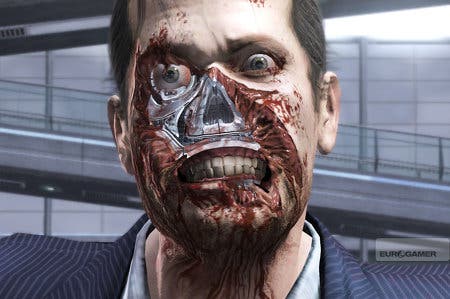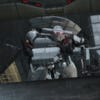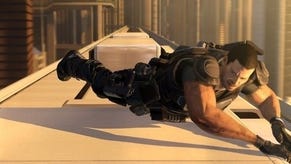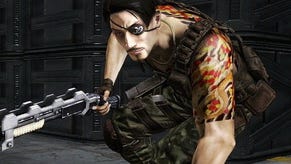Binary Domain Preview: When East Meets West
Can Sega's big gamble pay off?
It has, since its unveiling late in 2009, been hard to muster much in the way of enthusiasm for Binary Domain. Fronted by a stubble-chinned, crop-haired hero who's seemingly more anonymous than the waves of robots he's tasked with gunning down, it's a game that's generic to the point of rendering itself invisible.
If Sega's own Tokyo studio's perverse objective has been to blend in its first foray in to the duck and cover shooter genre crowd in much the same way as Binary Domain's new breed of robots try to hide themselves within its imagined future society, it's proved successful; some have emerged from demos from this year's trade shows with little recollection of what they've just witnessed, an instant amnesia brought on by what seems to be a particularly inoffensive yet uninspiring effort.
It's all the more dispiriting when you consider the heritage behind the studio that's developing Binary Domain - this is the same outfit that has in recent years produced the consistently brilliant Yakuza series, games that are as colourful as they are eccentric and unique, and it's headed up by one gaming's few rockstar developers, Toshihiro Nagoshi. But beneath Binary Domain's innocuous exterior there's something smarter, more cunning and ultimately more beguiling than first looks might lead you to believe. Yes, it's a third person shooter set in a dreary monochrome future, but it's one that's got character, style and a handful of neat tricks to boot.
And despite it's familiarity, as a third person shooter developed by a Japanese studio it's something of a novelty, the choice of genre coming in a studied attempt for an outfit that's revelled in exploring the minutiae of contemporary Eastern culture to break out and embrace a wider global audience - and, more explicitly, to court a Western audience that for all its kind words about the Yakuza games has failed to support them in any large number.
"In terms of the basic designs and artistic style, we're using quite a Western style," acknowledges Nagoshi, speaking to us earlier this year in a typically detached drawl, "Western users will feel that this is a Western game. But since the location is Tokyo, Japanese users will see areas they recognize. It kind of depends on different users - they'll bring different experiences to it."
Senior developer Masayoshi Kikuchi, a straight-laced foil to the more flamboyant Nagoshi, is more direct in stating Binary Domain's aims. "The reason we chose a third person shooter is that we've always been making the Yakuza series, a game for Japanese people and with Japanese people in mind," he admits, "This time one of the goals we'd set ourselves is to try and appeal to a wider audience, and that is one of the reasons why we went for a third person shooter."
As much as it's a calculated decision to woo the Western market, it's most definitely a brave one; Japan's had little joy in creating a third person shooter in more recent years, with efforts like MindJack and Quantum Theory showing that some concepts just don't travel, while the one possible exception - the Platinum-developed Vanquish, also published by Sega - is something of a misnomer.
"I worked on both Vanquish and Binary Domain," says Kikuchi, "and I think that Vanquish really was an action game over being a shooter title - but when people first see it people thought it was a shooter title. While the game was very good, it was quite unfortunate - it was misleading in a way, as people didn't get what they expected to get."
Binary Domain, on the other hand, plays it a little straighter. There's none of Vanquish's acrobatics, and sadly a little less of that game's cool and cocky charm, but it's all conducted at a deliberately more measured pace. Guns are pleasantly overstated both in design and in their impact, amplified by the brittle robot enemies that tear apart piece by piece, dragging themselves nearer with servo-powered arms if you shred their legs away. And they're enemies that offer a satisfying diversity; the naked androids of the opening chapter give way to a duel with a towering robot that's seemingly strayed in from the Metal Gear series and who is impervious to gunfire - but not impervious to the high-grade, large-scale industrial machinery in which the battle takes place and that's at your disposal. Later levels promise smarter, more threatening foes as you get closer to the Amada corporation that are producing robots that are a little too human.
But while this is a third person shooter it's not strictly an action game, and where Vanquish offered brash and intoxicating spectacle Binary Domain is looking to run a little deeper, offering RPG elements that are best witnessed in its novel consequences system. Here, instructions barked out to teammates - either through a radial menu or through voice command that's sticky but competent - impact relationships, with terse words eventually resulting in cooled-off friendships and words of encouragement inspiring more camaraderie. It is, in short, a little like Mass Effect, but here rather than conversations being shifted aside to static dialogue scenes they're woven effortlessly into the action, and it's action that's informed more directly by those very words.
It's a character piece, then, and if the characters of Binary Domain seem a little unremarkable at first there's at least the tools and environment for them to expand and engage - as well as a framing story that's atypically strong. You're Dan Marshall, who in 2080 is seemingly taking a break from making potty-mouthed indie adventures to lead a military group tasked with hunting down illegally produced androids, creations that look human as well as fully believing that they're human too. It's a conceit lifted straight from Phil Dick, although it's nice that someone's lifted something other than the rain and neon that framed Ridley Scott's take on the Californian writer's best-known work.
What marks it out is a style and sensibility to the story's telling from which it's possible to draw a thick line to the Yakuza series. "It's the same guys that are making it so you can expect to see a lot of similarities," says Kikuchi, "Even though the genre's different, and the setting's totally different. It's an easy story to get in to, but it has deep implications in its outcome and strong themes."
And while Binary Domain is going out of its way to woo a Western audience, there are still traits that are undeniably those of the Yakuza team. Its playable leads may be Western, but it's still Tokyo that they're exploring - and like the series that preceded it, Binary Domain promises an exploration of a space that's been thoughtfully created.
This is a Tokyo that, thanks to all-consuming floods, has built towards the heavens, the sprawl of contemporary Tokyo funnelled up into a towering city that's vertically tiered. At the base the slums are lapped by waves of grey water, while further up areas become more and more affluent. It is, in a way, reminiscent of Osamu Tezuka's Metropolis as bought to life in the 2001 anime, and it's got an equal amount of character. A broken Shibuya that's drenched in light from cracked neon is an early highlight - and you half expect to see Yakuza's Kazuma Kiryu sprint around a corner on his way to his next fistfight.
It still suffers from something of an identity crisis - and it's going to be hard for Sega to make much of an impact on a market that, the team admits, is already overcrowded. "But we couldn't just choose a strange genre of game to try and appeal to Western audiences," admits Kikuchi, "otherwise people wouldn't pick it up in the first place. The team feels that while having this genre, we can make something appealing while creating something distinct from other shooters. We chose the platform, and now it's up to us to get in there with our own distinctive features."
Nagoshi, somewhat predictably, is more forthright in his opinions, and is unashamedly proud of what he and his team have achieved. He's even had time to throw in a couple of references to his past work, with Yakuza not the only game to be plundered - one extended early section sends players hurling down a sewer chute, bringing to mind the superlative F-Zero GX.
"Looking back at my career, I've worked on so many different genres, I've pretty much covered all the popular genres," he says, "Even though it wasn't the intention, Binary Domain is becoming something of a best of Nagoshi." Having peeked beneath its initially off-putting exterior, it's certainly set to be one of his more intriguing.
















.png?width=291&height=164&fit=crop&quality=80&format=jpg&auto=webp)




.jpg?width=291&height=164&fit=crop&quality=80&format=jpg&auto=webp)
